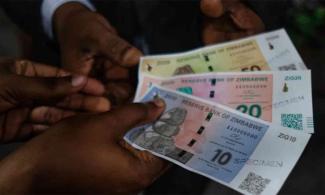
The Zimbabwe government has said any business or corporate using inflated exchange rates higher than the official rate of 13.5 ZiG per U.S. dollar will be liable for a fine of 200,000 ZiG ($14,815).
The Southern African country mentioned this in a notice made available to newsmen on Friday, insisting the only legalised exchange rate within the country’s jurisdiction was its newly introduced gold-backed currency, the Zimbabwe Gold (ZiG).
The notice stated that anyone offering "goods or services at an exchange rate above the prevailing interbank foreign currency selling rate" would be guilty of a civil infringement, read the notice, issued late on Thursday.
There have been several reports on how the government had been making efforts to keep the ZiG afloat since its launch in early April, with authorities launching a blitz on illegal foreign currency traders last month.
However, it was learnt that some businesses such as supermarkets had been making the procedure difficult for the government as they charged a premium above the market rate for customers paying in the new currency, while the ZiG was being rejected by informal traders.
Recall that Zimbabwe's treasury had moved to enforce the use of the ZiG as the official unit of exchange for transactions since Tuesday.
This is Zimbabwe's fourth attempt at having a local currency within a decade, with the Southern African country dumping the Zimdollar last month after it lost 70% value since the start of the year.
According to a report recently done by the Voice of America, the newly introduced gold-backed currency has been sliding on the local black market but officials insist the currency is getting stronger and has a bright future.
Even songs are played on the radio encouraging citizens to embrace the currency, called Zimbabwe Gold — or ZiG — introduced on April 5 trading at 13.56 to the U.S. dollar.